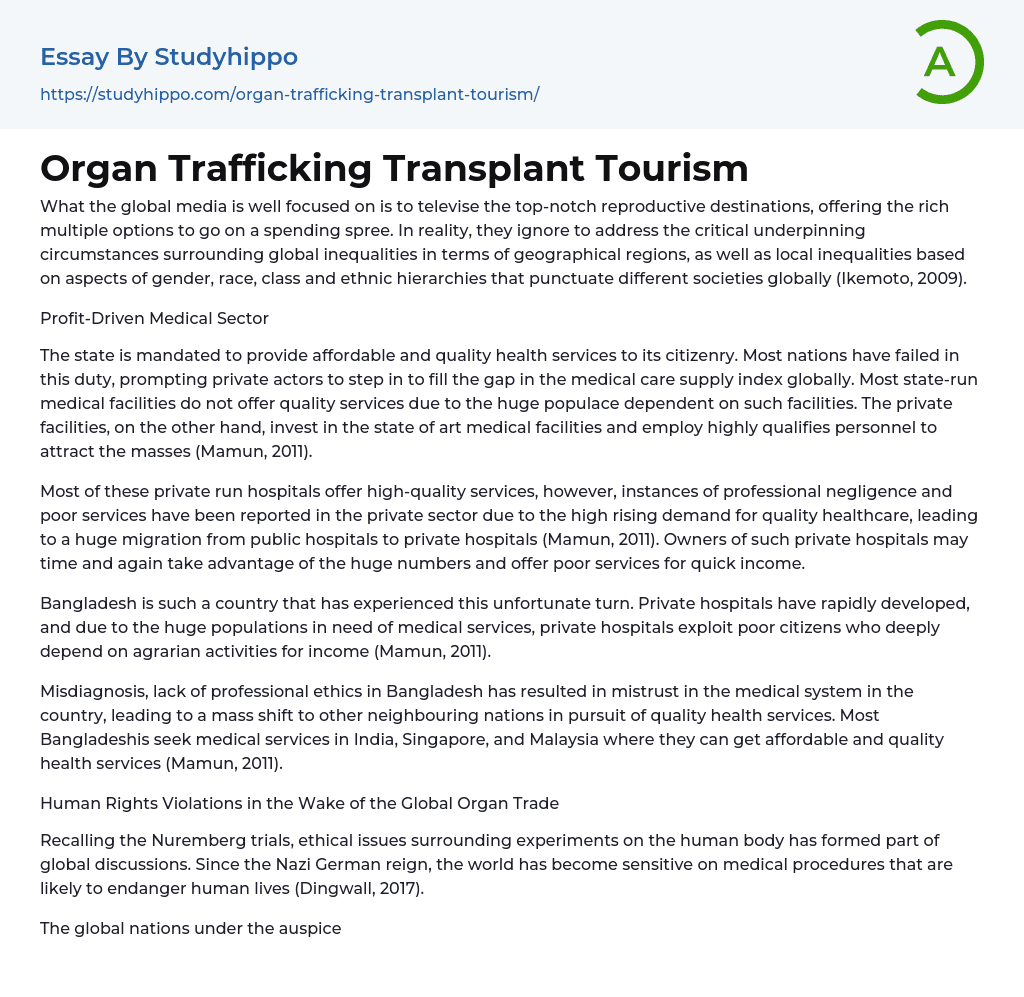The media worldwide prioritizes showcasing opulent reproductive destinations and enticing wealthy individuals with a plethora of extravagant choices for indulging in excessive spending. Sadly, they overlook crucial factors such as global disparities across different geographical regions, as well as local disparities influenced by gender, race, social class, and ethnic hierarchies that significantly affect societies globally (Ikemoto, 2009).
The Profit-Driven Nature of the Medical Sector
It is the responsibility of the state to ensure that its citizens have access to healthcare that is both affordable and of high quality. Unfortunately, many countries have struggled to meet this obligation, resulting in private entities becoming prominent players in global medical care provision. State-owned medical facilities often struggle to deliver satisfactory services due to the high volume of patients they serve. In contrast, private facilities prioritize investment in cutting-edge medical equipment and hiring highly
...skilled personnel in order to attract patients (Mamun, 2011).
The private hospital sector in Bangladesh has grown rapidly, offering high-quality services. However, there have been reports of professional negligence and poor services due to the increasing demand for quality healthcare. This has resulted in a significant migration from public hospitals to private hospitals (Mamun, 2011). Unfortunately, some owners of these private hospitals may take advantage of the large numbers and provide substandard services in order to make quick money. These actions exploit vulnerable citizens who rely on agriculture for their income (Mamun, 2011).
Misdiagnosis and unethical practices in Bangladesh's medical system have eroded trust among its citizens. Consequently, many Bangladeshis are seeking healthcare services in neighboring countries like India, Singapore, and Malaysia for affordable and high-quality treatment (Mamun, 2011).
Global Organ Trade: A Breach of Human Rights
The international communit
has engaged in discussions about the ethical concerns surrounding experiments on the human body since the Nuremberg trials. With a heightened awareness of medical procedures that endanger lives following Nazi Germany's atrocities, there is now greater sensitivity towards addressing potential risks (Dingwall, 2017). There have been multiple deliberations by the United Nations and global nations to establish international conventions aimed at regulating and decriminalizing human rights violations associated with organ trafficking. It is crucial to consider the human implications beyond supply and demand when dealing with organ trade issues.
Issues related to human rights must be approached with the highest level of seriousness and respect that they merit. The World Health Organization (WHO) has been instrumental in creating guidelines and mechanisms to address different facets of human trafficking. Working together with the International Society for Nephrology, WHO established the Istanbul Declaration on Organ Trafficking and Transplant Tourism in 2008. Furthermore, the United Nations Office on Drugs and Crime has actively campaigned for making illicit organ trafficking illegal and ensuring appropriate punishment through criminal justice systems (Debra Budiani-Saberi, 2013).
The guidelines developed by the WHO and the UN are primarily intended for transboundary situations. However, these guidelines have often been abused, resulting in local violations within the boundaries of states and undermining efforts to combat illegal trade. Many donors who are deceived into participating in cross-border organ donation in exchange for financial gain end up being exploited. They are often denied medical care and legal support after undergoing unsafe organ removal procedures (Debra Budiani-Saberi, 2013).
- alternative medicine essays
- Aspirin essays
- Cannabis essays
- Cardiology essays
- Cloning essays
- Dentist essays
- drugs essays
- Hemoglobin essays
- Medical essays
- Medical Ethics essays
- Organ Donation essays
- Patient essays
- Pharmacology essays
- Plastic Surgery essays
- Surgery essays
- Therapy essays
- Vaccines essays




